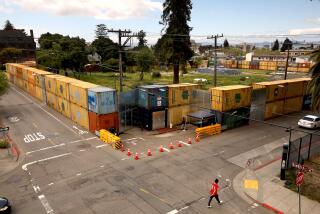Orange County Voices : COMMENTARY ON CALTRANS : Caltrans Engineers to Contractors--Our Way or the Highway : Court ruling that state can’t use private-sector employees for work such as freeway engineering and design is a dead end.
- Share via
Several weeks ago the courts put up another roadblock to California’s economic recovery. Right now the setback might seem painless for the average Californian. But if you’re the employee of a small Orange County engineering company that just saw millions in state contracts blocked by a minor-league judge, it means cutbacks, layoffs and potential disaster.
And if you’re a commuter concerned about the rapid completion of the state’s ambitious seismic retrofitting program (I think that covers just about all of us), the worrisome time spent in a traffic jam under connectors such as the 605/405 freeway separation in Seal Beach just got longer.
The roadblock came from Sacramento Superior Court Judge Eugene T. Gualco, who declared that the recently passed state law that allows the state Department of Transportation to contract out its design work with private sector engineering firms was unconstitutional. This was his third ruling against contracting out--this time Gualco responded favorably to a suit brought by the Professional Engineers in California Government (PECG), a Caltrans engineers’ union.
Gualco said that Article VII of the state Constitution prohibits the state from using private-sector employees for state projects such as freeway engineering and design. Many legal experts claim that Gualco’s interpretation of Article VII is a stretch at best--the article itself sets up the state’s civil-service system, protects us against officeholders who’ve threatened to overthrow state government, and establishes the Judges’ Retirement System. Unless I’ve missed it, the article contains no mention of whom the state can employ to design its freeways.
Supporters of contracting out will vigorously appeal the decision. But appeals take time. And this particular suit, offensive in both its goal to thwart the will of the Legislature and the recovering California economy, means immediate delays on more than $60 million in seismic retrofitting projects that were to go out to bid this summer to private industry. Retrofitting we had hoped to see on the Garden Grove, San Diego and the Santa Ana freeways well before the next quake. Like the kind that might have kept the Santa Monica Freeway up on its support beams last January. Like the kind that would have created hundreds of engineering jobs in an employment sector that can be more competitive than Caltrans. But this will not occur; PECG would rather jeopardize important projects and screen out its competition than face them on a level playing field.
Hyperbole and personal irritation aside, the judge’s efforts to block contracting out will seriously affect small Orange County engineering businesses, many of which are minority- and women-owned firms. Still more are the new employers of many highly qualified Californians displaced by aerospace and defense cutbacks.
Irvine’s Coast Surveying is just one of 600 companies throughout the state that could see its 30-employee payroll change. Coast has been an active Caltrans contractor, taking on projects that Caltrans itself was unable to complete during demand peaks. To such companies as P&D; Technologies of Orange and the Irvine Spectrum’s Robert Bein, William Frost & Associates, a single Caltrans retrofitting contract valued at $1 million would employ at least 10 new primary positions (and even more support staff). Newport Beach’s Boyle Engineering may find as many as 21 of its top seismic engineers affected by the decision.
With larger primary contracts in the $4-million range, Bein suggests that 30% to 40% are subcontracted to minority- and women-owned firms such as Coast. Forced to bid against each other for the Caltrans contracts, firms such as these have been able to stay lean and efficient--they know how to make the most of a taxpayer dollar. For example, thanks to its competitive bids, more than three-quarters of Coast’s work last year was transportation-related, with most of that coming from Caltrans.
Unlike its private sector competition, Caltrans didn’t learn much from the downsizing and streamlining of the early ‘90s. Documentation of Caltrans’ efficiency problems is as recent as three months ago.
In February, SRI International, a renowned Bay Area auditing firm, released what some analysts called a “scathing” management audit of Caltrans. SRI put forth 14 key recommendations for change, including the enhanced use of private sector engineers in Caltrans’ design operations. The audit further warned that Caltrans was beset with efficiency problems and called for the creation of a system of discipline and rewards to improve employee productivity.
We saw the benefits of contracting out and monetary awards to improve efficiency when the Santa Monica Freeway opened weeks ahead of schedule. Using its emergency powers, the state used contracting out and speed bonuses to get the world’s busiest freeway open early.
Did Judge Gualco dare state that such an action was “improper” or “unconstitutional”? No, curiously, he exempted from his decision repair projects resulting from the Northridge quake and already underway. So contracting out is good enough for us when we really need to get the job done--not the rest of the time when we’re just plugging along behind schedule.
And plug along we’ll continue, waiting for the next quake to break our pace. So what if the commuters, Orange County’s engineering firms and the taxpayers all deserve better.
More to Read
Sign up for Essential California
The most important California stories and recommendations in your inbox every morning.
You may occasionally receive promotional content from the Los Angeles Times.













